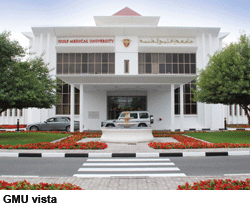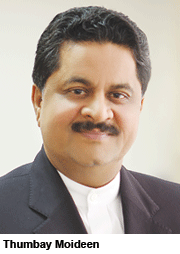Conferred university status in 2008, GMU is the first private medical university in the United Arab Emirates, attached to a 250-bed multi-speciality teaching hospital
 For over half a century, the United Arab Emirates (UAE), with Dubai as its capital, has been a magnet for hundreds of thousands of Indian immigrants in search of gainful employment and tax-free incomes. However in recent years, the UAE (pop. 7.5 million), which comprises seven emirates or principalities, has gradually morphed into an affordable study destination attracting students from India and South-east Asia.
For over half a century, the United Arab Emirates (UAE), with Dubai as its capital, has been a magnet for hundreds of thousands of Indian immigrants in search of gainful employment and tax-free incomes. However in recent years, the UAE (pop. 7.5 million), which comprises seven emirates or principalities, has gradually morphed into an affordable study destination attracting students from India and South-east Asia.
The promotion of the Dubai Knowledge Village in 2003 prompted several high-profile education instit-utions including Middlesex University (UK), London Business School and Manipal University (India) to establish fully-fledged campuses in Dubai. Though Dubai is undoubtedly the jewel in the UAE crown, the emirate of Ajman, a 20 minute drive from Dubai, enjoys the unique distinction of hosting UAE’s first private medical varsity — Gulf Medical University (GMU).
Founded in 1998 as the Gulf Medical College, GMU was conferred university status on July 1, 2008 by the UAE’s ministry of higher education and scientific research. Listed in the World Health Organisation’s World Directory of Medical Schools and the International Medical Education Directory, GMU offers 88 undergraduate, post-graduate and certificate programmes in medicine, dentistry, pharmacy and health education to 600 students (including 80 from India) mentored by 63 highly-qualified faculty. The London-based Quacquarelli Symonds (QS), which publishes its annual QS World University Rankings, also awards star status (one-five) to newly-promoted institutions of higher education. In its latest 2011 rankings, QS has rated GMU a three-star university. On the para-meter of engagement with the local community, it has been awarded five stars, internationalisation (four), infrastructure (five), quality of teaching (four), and most significantly employability (five).
 Promoted by the Thumbay Group (estb. 1997), an Ajman-based company with interests in healthcare, education, retail, real estate, and import-export, GMU is gearing to celebrate its 14th anni-versary in January next year. Comments Thumbay Moideen, the India-born founder president of the varsity: “GMU has made steady progress during its first 14 years. Our vision for the future is clear and bold — to develop GMU into one of the world’s pre-eminent medical schools measured by the excellence of our students and faculty, the success and innovative nature of our research and educational programmes and the quality of clinical care we provide to patients.”
Promoted by the Thumbay Group (estb. 1997), an Ajman-based company with interests in healthcare, education, retail, real estate, and import-export, GMU is gearing to celebrate its 14th anni-versary in January next year. Comments Thumbay Moideen, the India-born founder president of the varsity: “GMU has made steady progress during its first 14 years. Our vision for the future is clear and bold — to develop GMU into one of the world’s pre-eminent medical schools measured by the excellence of our students and faculty, the success and innovative nature of our research and educational programmes and the quality of clinical care we provide to patients.”
The university’s teaching hospital — the 250-bed Gulf Medical College Hospital and Research Centre — is the first private multi-speciality teaching hospital in the UAE. On completion of their study programmes, students receive compulsory clinical training and internship for a period of one year in the hospital.
Ajman. The United Arab Emirates comprises seven emirates inclu-ding Ajman, Abu Dhabi, Dubai, Fujairah, Ras al-Khaimah, Sharjah, and Umm al-Quwain. Ajman (pop. 361,000) is centrally located on the western coast of UAE along the Persian Gulf and is ruled by H.H. Sheikh Humaid bin Rashid Al-Nuaimi. Occupying a mere 260 sq. km, Ajman is the smallest emirate, offers clean and unspoilt beaches, and is well-connected by road with the other emirates. Cultural and historical landmarks include the Ajman fort, Sheikh Zayed mosque, Ajman museum and Etisalat Tower. In recent years, like its sister emirate Dubai, Ajman has also experienced a construction and develop-ment boom. But most of this const-ruction activity is currently on the backburner because of the global financial crisis of 2009.
While Ajman enjoys a moderate climate with mean temperatures ranging between 21-35°C it does experience extremes. Winter temperatures can drop as low as 14oC while in summer, they could rise to 47oC.
Campus facilities. Sited on an expansive 100,000 sq metres, the state-of-the-art GMU campus boasts thoroughly modern classrooms, well- equipped laboratories, sports compl-exes, and administrative buildings. Occupying pride of place on the 200,000 sq. ft built-up area is the GMU Information and Learning Centre which houses a fully automated library with 6,000 volumes, 400 journal subscriptions, audio-video room, a computer laboratory with 80 terminals, eight multimedia labs, a graduate study centre, eight learning rooms and internet browsing centre. Sports facilities include courts for tennis, basketball, volleyball, cricket and football grounds, athletics track, gym and swimming pool. A cafeteria, fine dining restaurant and health club and spa too are sited on campus.
GMU’s teaching hospital — the 250-bed Gulf Medical College Hospital and Research Centre — is sited a few miles away. The first private multi-speciality teaching hospital in the UAE, it houses the departments of anaesthesiology, cardiology, internal medicine, general surgery, obstetrics and gynaecology, paediatrics, orthopaedics, ophthal-mology, psychiatry, dermatology, ENT, urology, dentistry etc. The hospital is also equipped with hi-tech medical equipment, computer workstations, internet connectivity, and video and teleconferencing facilities. Free medical treatment is offered to all GMU students at the hospital.
Admission. The minimum eligibility criterion for admission into undergraduate medical programmes is completion of Plus Two with physics, chemistry and biology (PCB). CBSE and CISCE board students are required to complete Plus Two with an average of 75 percent while state board students need 80 percent with a minimum of 70 percent in PCB to qualify for admission. In addition, students from India have to submit proof of proficiency in the English language (TOEFL or IELTS scores).
For admission into postgraduate programmes, graduates of accredited medical schools in the UAE or graduates of an IMED (International Medical Education Directory)-listed medical school outside the UAE are eligible to apply. Proof of proficiency in the English language is required.
The deadline for receipt of applications is the last working day in the month of July. For further details, contact P.O. Box: 4184, Ajman, United Arab Emirates; Tel: +971 6 7431333; Fax: + 971 6 7431222; e-mail: admissions@ gmcajman.com, gmcajman@emirates. net.ae; website: www.gmu.ac.ae, www.gmchospital.com
Accommodation. Separate hostels with single or shared accommo-dation are provided for men and women students. Indoor games and internet facilities are available in the hostels where resident wardens offer assistance and advice to students.
Degree programmes. GMU comprises five colleges offering undergraduate, postgrad and diploma programmes. Moreover the university’s Centre for Continuing Education and Community Outreach offers 70 short term certificate programmes (see box).
|
Scholastic options at GMU
GMU offers a wide range of undergraduate, postgraduate, certificate and diploma programmes across its five colleges and Centre for Continuing Education and Community Outreach.
College of Medicine. Bachelor of medicine and bachelor of surgery (MBBS, five years plus one-year internship)
College of Dentistry. Doctor of dental medicine (DMD, five years plus one-year internship)
College of Pharmacy. Doctor of pharmacy (four and half years plus one-year internship)
College of Allied Health Sciences. Masters in clinical psychology (MS CP, two years), Masters in toxicology (MS Tox, two years), Masters in public health (MPH, two years) and diploma in toxicology (Dip Tox, one year)
Centre for Continuing Education and Community Outreach. Certificate courses (ten months) for dental assistants, medical assistants (laboratory); administration; clinical, physical therapy assistants, nursing and pharmacy assistants.
Other short-term certificate courses include introduction to health careers, medical terminology, medical billing and coding, medical insurance billing, dental office management, phlebotomy, nutrition for sports and human performance, legal fundamentals of healthcare and public health, infection control for non-clinical healthcare workers, clinical nutrition, geriatric healthcare, ECG monitor technician, pharmacy review, pharmaceutical sales and marketing, etc.
Tuition fees. UAE Dirham 25,000-95,000 per year.
Living expenses: UAE Dirham 13,500-20,000 per year
|
Swati Roy & Summiya Yasmeen